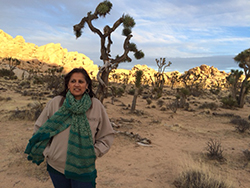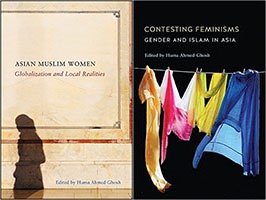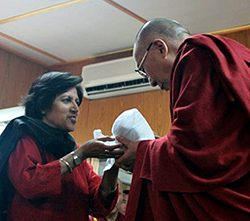Huma Ahmed-Ghosh, Professor Emerita
 Email: [email protected]
Email: [email protected]
Curriculum Vitae
Dr. Huma Ahmed-Ghosh is Professor Emerita in the Department of Women's Studies at San Diego State University. She is also on the Advisory Board of the Center for Islamic and Arabic Studies and the Center for Asia-Pacific Studies. Her research focuses on women in Afghanistan, Muslim immigrant women to the USA, and Islam and feminism.
Ahmed-Ghosh has published extensively on her research on Muslim women's issues in India, the USA and on women in Afghanistan. Ahmed-Ghosh has also published articles on gendered ageing in India, widowhood and domestic violence in India.
Ahmed-Ghosh recently published two edited books titled, Contesting Feminisms: Gender and Islam in Asia, and Asian Muslim Women: Globalization and Local Realities published by SUNY Press, New York (2015). She is currently working on a book titled, Women Transforming Communities: Confronting Conflict and Building Peace about gendered violence and conflict.
 Books
Books
- Ahmed-Ghosh, Huma. (ed.) Asian Muslim Women: Globalization and Local Realities. New York: SUNY. 2015.
- Ahmed-Ghosh, Huma. (ed.) Contesting Feminisms: Gender and Islam in Asia. New York: SUNY. 2015
Articles in Refereed Journals
- Ahmed-Ghosh, Huma. 2011. Juggling Afghan Motherhood in the Diaspora. Journal of Motherhood Initiative. Nov. Vol.2, No.2. Pgs. 239-250.
- Ahmed-Ghosh, Huma. 2009. Ageing and Gender in India: Paradoxes of a Feminist Perspective. Asian Women. Summer. Vol. 25, No.2. Pgs. 1-27.
- Ahmed-Ghosh, Huma. 2009. Widow’s in India: Issues of Masculinity and Women’s Sexuality. Asian Journal of Women’s Studies. Vol. 15, no.1. Pgs. 23-53.
- Ahmed-Ghosh, Huma. 2008. Dilemmas of Islamic and Secular Feminists and Feminisms. Journal of International Women’s Studies. Vol.9, no.3. Pgs. 1-18.
- Donadey, Anne and Huma Ahmed-Ghosh. 2008. Why Americans Love Azar Nafisi’s Reading
Lolita in Tehran. Signs: Journal of Women in Culture and Society 33.2 (Winter). Pgs.623-646. Reproduced in the virtual special issue of Signs on Visibility and Visuality: Reframing Gender in the Middle East, North Africa,
and Their Diasporas (2012).
- Ahmed-Ghosh, Huma. 2006. “Ahmadi Women: Reconciling Faith with a Vulnerable Reality.” Journal for International Women’s Studies.November. Vol. 8, no. 1. Pgs. 36-51.
- Ahmed-Ghosh, Huma. 2006. “Voices of Afghan Women: Women’s Rights, Religion and Culture.” International Feminist Journal of Politics. March. Vol.8, no.1, Pgs.110-128.
- Ahmed-Ghosh, Huma. 2004. “Portraits of Believers: Ahmadi Women Performing Faith in
the Diaspora.” Journal of International Women’s Studies. Nov.vol.6, no.1. Pgs. 73-92.
- Ahmed-Ghosh, Huma. 2003. “A History of Women in Afghanistan: Lessons Learnt for the
Future.” Journal of International Women’s Studies. vol.4.no.3. May. Pgs.1-14.
- Ahmed-Ghosh, Huma. 2003. “Writing the Nation on the Beauty Queen’s Body: Implications
for a ‘Hindu’ Nation.” Meridians: feminism, race, transnationalism. vol.4. no.1. October. Pgs. 205-227.
- Ahmed-Ghosh, Huma. 2003. “Chattels of Society: Domestic Violence in India,” Violence Against Women. vol.10. no.1. December. Pgs. 94-118.
- Ahmed-Ghosh, Huma. 1987. “Changes in the Status of North Indian Women - A Case Study
of Palitpur Village.” Working Paper No. 141, Michigan State University: Women in International Development. Pgs. 1-23.
- Ahmed, Huma. 1980. “Protest Movements by Women.” Journal of Youth Affairs. September. New Delhi: Vishwa Yuva Kendra. Pgs. 7-20.
Chapters in Refereed Books
- Ahmed-Ghosh, Huma. 2015. “Being a Woman, a Muslim, and Afghan in the USA: Dilemmas
of Displacement.” In Gendered Journeys: Women, Migration, and Feminist Psychology, edited by Oliva Espin and Andrea L. Dottolo. New York: Palgrave Macmillan.
- Ahmed-Ghosh, Huma. 2012. “Afghan Women: At the Intersections of Local and Global Oppression.”
In Contesting Nation: Gendered Violence in South Asia, edited by Angana Chatterji and Lubna Choudhury. New Delhi: Zubaan. Forthcoming.
- Ahmed-Ghosh, Huma. 2005. “Deconstructing the Human Rights Discourse: Relevance for
Afghan Women.” In Sustainable Development: Bridging the Research/Policy Gaps in Southern Contexts, edited by Saba Khattak. Islamabad: Oxford University Press. Pgs. 98-107.
- Ahmed-Ghosh, Huma. 1994. “Preserving Identity: A Case of Palitpur.” In Forging Identities: Gender, Community and the State, edited by Zoya Hasan. New Delhi: Kali for Women/Westview Press. Pgs. 169-187.
- Ahmed-Ghosh, Huma. 1993. “Agricultural Development and Work Pattern of Women in a
North Indian Village.” In Women and Work in South Asia: Regional Patterns and Perspectives, edited by Saraswati Raju and Deipica Bagchi, London: Routledge. Pgs. 180-195.
- Ahmed-Ghosh, Huma. 1991. “From Ivory Towers to Mud Huts: Trials and Acceptance of
a Fieldworker.” In From the Female Eye: Accounts of Women Field Workers Studying Their Own Communities, edited by M.N. Panini, New Delhi: Hindustan Publishing Corporation. Pgs. 11-19.
Other Publications
- Ahmed-Ghosh, Huma. 2012. Guest Editor. Islam and Lesbianism. “Introduction.” Journal of Lesbian Studies. Vol. 16, No. 4.
- Ahmed-Ghosh, Huma. 2009. Guest editor. Special Issue on, “Gender and Islam in Asia.” Journal of International Women’s Studies. Nov. Vol.11, no. 1.
- Ahmed-Ghosh, Huma. 2006. “Role of Women-run NGOs in the Reconstruction of Afghanistan.”
Conference proceedings. World Association of NGOs. New York. Ahmed-Ghosh, Huma. 2004.
“Afghan Women’s Rights: Trials and Tribulations.” TJSL Law Review (Thomas Jefferson
School of Law) Fall vol.27, no.1. Pgs.27-33.
- Ahmed-Ghosh, Huma. 2003. “The USA Patriot Act and Anthropology.” Anthropology News. vol.44. no.1. Pg.10. April.
- Ahmed Ghosh, Huma. 2001. “Feminist Perspective: September 11th and Afghan Women.” Lemar- Aftaab. Afghanmagazine.com.December 2001. Pg. 1-2. Translated into French.
- Ahmed-Ghosh, Huma. 2000. “Impact of Globalization on the Images of Older Women in
India.” Report of International Symposium on the Impact of Globalization on the Images of
Older Women. United Nations Programme on Ageing. Pgs.21-28.
- Ahmed Ghosh, Huma. 1999. "Gendering Anthropology." Anthropology Newsletter. San Diego State University. Pgs. 1,6.
- Ahmed Ghosh, Huma. 1998. "Women Trapped in a Web of Hierarchy: Life Cycle of Women
in India." INSTRAW. (a United Nations Publication). Pgs.10-17.
- Ahmed-Ghosh, Huma. 1995. “Muslim Women Reflecting Changes in State-Society Relations
in India.” Farhang: The Persian Cultural Review. Winter. Volume 5. Pgs. 8-12.
- Blumberg, Rae Lesser, with Huma Ahmed-Ghosh. 1989. “Income Under Female Versus Male
Control: Differential Spending Patterns and Consequences When Women Lose Control of
Returns to Labor.” Population and Development Series, The World Bank. Pgs. 60-72.
Media
- Union Tribune (San Diego newspaper). 2014. Interviewed and featured about SDSU’s Sexual
Violence Task Force.
- KPBS Radio. 2013. Muslims, Gay Rights and Family Issues. Two-part Series with Angela
Carone.
- KPBS Radio. 2012. Midday Edition with Maureen Cavanaugh on Women in Afghan Prisons.
- India Abroad (Indian weekly published in New York). 2006. Interviewed and featured
about Post 9/11 Experiences of Moderate Muslims in the USA. Sept. 15.
- FOX in the Morning (T.V.) 2006. Interviewed by Desiree Carvajal: Women in Afghanistan.
March 30.
- KPBS Radio. 2004. In The Lounge with Dirk Soutro. Human Rights and Immigrants. Iraqi
women writers in exile.
- KPBS Television. 2003. Panelist on Democracy in Iraq, and Muslim Immigrants in San
Diego. Panels hosted by Gloria Penner.
- Channel 8. 2003. Interviewed by Phil Blauer on situation of Afghanistan.
- BBC, London. 2002. Interviewed by Innes Bowen on Queen Soraya and the Afghan Women’s Movement.
 Travel Study Abroad Program: India
Travel Study Abroad Program: India
June-July 2015
Travel Study Abroad Program: Kingston, Jamaica
2014
Travel Study Abroad Program: India
2012-2013
Travel Study Abroad Program: Ghana
2011
Partnered with Africana Studies
Travel Study Abroad Program: South Africa
2009
Partnered with Africana Studies